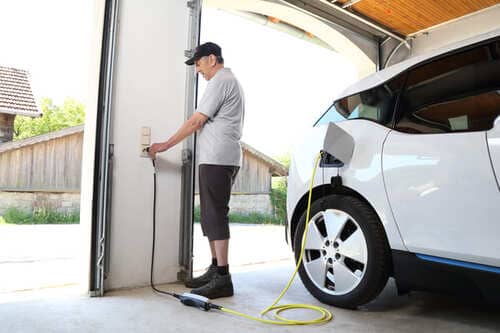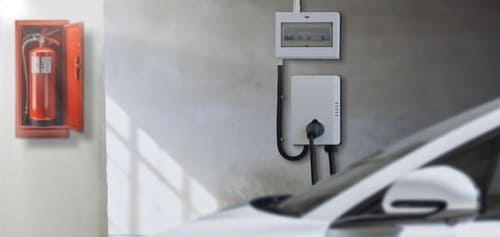
Why do electric cars catch fire?
In recent years, electric cars have become increasingly popular. However, concerns about their fire risk in comparison to conventional vehicles still exist. Here we will delve into whether electric cars really do catch fire more quickly than traditional models and what to do in the event that your electric car catches fire.
Are electric cars safe?

Electric cars have a lower accident risk compared to other cars. This is because they usually have more modern safety features and standards. The battery in an EV is responsible for lowering the car's centre of gravity, which reduces the risk of rollover accidents. Additionally, EVs have a minimal fire risk because the high-voltage system automatically switches off in case of an accident. As a result, first-aiders can work safely without the risk of electric shock or fire
Do electric cars catch fire?
It is a common belief that electric cars pose a higher risk of catching fire than conventionally powered vehicles, particularly in the event of a collision. However, it is important to note that this statement is not correct as the risk of fire or accidents is not greater with electric cars. In fact, the opposite is true as they are generally safer than cars with conventional engines.
Why do EV cars catch fire? Main causes
According to experts, the majority of vehicle fires are caused by spontaneous combustion, which cannot be completely ruled out, but is extremely rare. Contrary to popular belief, the main fire hazard is not the battery: in the event of an accident, the high-voltage system shuts down within milliseconds.
As a result, the battery is no longer powered. It is also virtually impossible for the battery to be deformed because it is so securely mounted in the car. The biggest fire risk comes from plastic parts. This material is extremely flammable because it does not contain chemical flame retardants. Therefore it is recommended to have your car equipped with a car fire extinguisher.
Extinguishing a fire and "thermal runaway"
There are two things you should know in connection with battery fires: Firstly, extinguishing an electric car requires increased effort. One of the priorities of the emergency services is to prevent the fire from spreading to the battery by cooling down the area around the battery. This not only requires a certain amount of expertise but also more time. There are now various specialised devices for securing the battery in the event of a vehicle fire.
Secondly, there is the unlikely but not completely ruled out possibility of a so-called "thermal runaway". This is a rare chain reaction in the battery that leads to a sudden release of energy and an associated fire hazard.
Fire statistics for electric cars in the UK

Fires involving electric vehicles (and one incident of a BMW blowing up) grab attention in the news, yet they are rare events. As per Honeywell Safety and Productivity Solutions, there were 239 incidents of fires associated with plug-in electric vehicles in the UK between July 2022 and June 2023.
Tesla statistics
By June 2023, a total of 198 Tesla vehicles had experienced fires. By November 2022, 57 Tesla cars had experienced fires. Tesla cars have a fire incident rate of one fire for every 175 million miles driven, in stark contrast to the national standard of one vehicle catching fire approximately every 19 million miles driven. Over a 9-year period, an estimated 143 Tesla cars have been involved in fire incidents, according to news reports. There have also been seven documented cases of Teslas catching fire while charging.
Did you know?
Damaged or faulty EV charging cable may cause electrical faults, short circuits or overheating, which could lead to a fire. That's why it's important for EV owners to regularly inspect their EV charging cables for signs of wear, damage or fraying, and replace them if needed.
EVs typically come with onboard charging ports designed to accept specific types of charging connectors. Using a charging cable designed specifically for a particular make and model such as a Nissan Leaf charging cable will help ensure that your vehicle is charged optimally and that the charging process is completed safely and effectively.
TOP products on the subject:









































